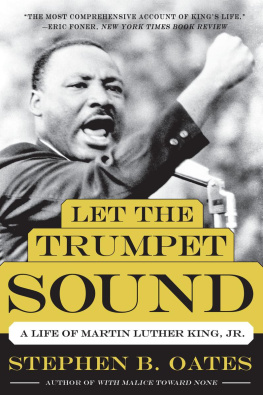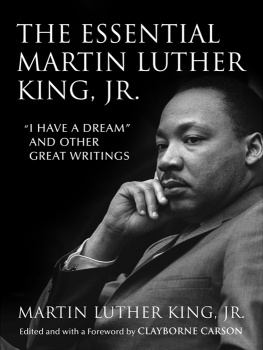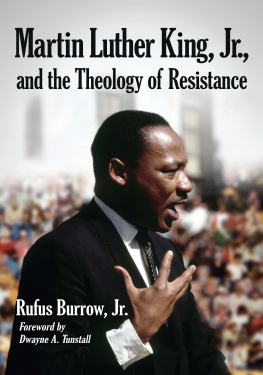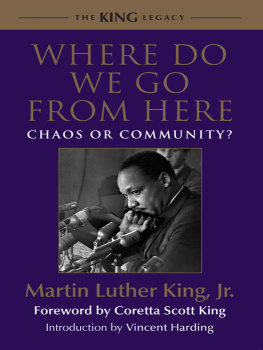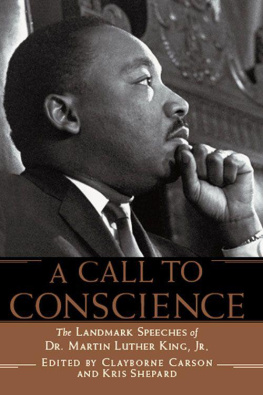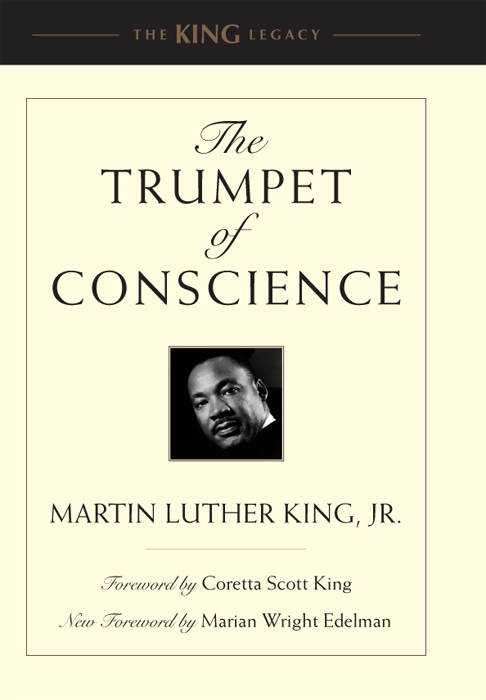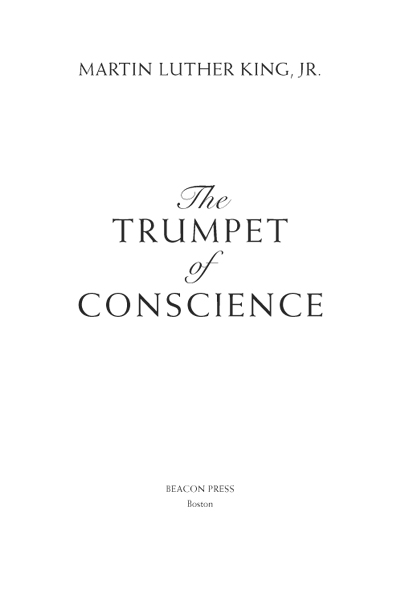FOREWORD
 Marian Wright Edelman
Marian Wright EdelmanT he Trumpet of Conscience is as important and relevant today as when Dr. King first gave the lectures that make up this book. We still need to listen to and heed the urgent messages contained in these five speeches. Consider words like these from the final selection, A Christmas Sermon on Peace, delivered at Ebenezer Baptist Church on Christmas Eve 1967 and more prophetic now than ever:
[I]f we are to have peace on earth, our loyalties must become ecumenical rather than sectional. Our loyalties must transcend our race, our tribe, our class, and our nation; and this means we must develop a world perspective. No individual can live alone; no nation can live alone, and as long as we try, the more we are going to have war in this world. Now the judgment of God is upon us, and we must either learn to live together as brothers or we are all going to perish together as fools.
Thanks to the tireless leadership of Coretta Scott King and others over many years, our nation now celebrates an official federal holiday in Dr. Kings honor every January, making him the only nonpresident and the only person of color so honored in our history. After numerous starts and stops, plans to construct a memorial to Dr. King on our National Mall are also moving closer to reality. It will be the first such memorial honoring not a president or a war hero, but instead our citizen prophet of nonviolence and a man of God who believed we could come together to build a beloved community. I am very proud that in the years since Dr. Kings death we Americans have come together to honor and celebrate him. I would be even prouderand more sanguine about our futureif we committed to following him.
A decade into the twenty-first century, we have made much but far from enough progress in overcoming the tenacious national demons of racism, poverty, materialism, and militarism Dr. King repeatedly warned could destroy America and all of Gods creation. We have not taken to heartor, worse, we have forgottentoo many of the admonitions he gave us here. Many Americans remember Dr. King warmly but have sanitized and trivialized his message and life. They remember Dr. King the great orator but not Dr. King the disturber of unjust peace. They applaud the Dr. King who opposed violence but not the Dr. King who called for massive nonviolent demonstrations to end war and poverty in our national and world houses. They applaud his 1963 I Have a Dream speech but forget how, as he told us in A Christmas Sermon on Peace, not long after talking about that dream I started seeing it turn into a nightmare.
Toward the end of his life Dr. King displayed increasing urgency as he spoke the truth about what he discerned and resisted those who sought to ghettoize his concern for social justice and peace. Black people told him to be quiet about his opposition to the Vietnam War, and not anger President Johnson and jeopardize his support for civil rights and anti-poverty efforts. White people told him to be quiet because he was not an expert on foreign policy, as if Black leaders and citizens had no stake in a war tearing our nation apart and taking disproportionate numbers of Black childrens lives. Some contributors deserted him as he called not only for an end to the Vietnam War but also for a fairer distribution of our countrys vast resources between the rich and the poor. Why, they asked, was he pushing the nation to do more on the tail of the greatest civil rights strides ever and challenging a president who already had declared a war on poverty? But Dr. King understood that our nations ills went deeper.
I hope as you read this book that you will ask: Where are the voices like Dr. Kings calling for common and moral sense today? Where are the leaders and citizens willing to struggle together to stem the out-of-control militarism, private-sector greed, and materialism that still drive us, to close the unprecedented gap between rich and poor, and to end the poverty and downward mobility of large numbers of our children?
Dr. King refused to give up his conviction that our nation could changeand so must we. As he said later on that last Christmas Eve, I still have a dream today that one day justice will roll down like water, and righteousness like a mighty stream. I still have a dream today that in all of our state houses and city halls men will be elected to go there who will do justly and love mercy and walk humbly with their God. With this faith we will be able to speed up the day when there will be peace on earth and goodwill toward men.
Is that day still coming? Thats up to you and me. Will we struggle and finally learn to live together as sisters and brothersor are we destined to perish together as fools? For those of us who still share Dr. Kings dream, his words in these five speeches will strengthen our own resolve to carry on his struggle to build the beloved community amid outer turmoil. In a world still teetering on the brink of nuclear suicide and spiritual insanity and desperately hungering for social justice and moral leadership, that noble, necessary, and hard but achievable vision beckons us today more than ever. Whether we are rereading it or encountering it for the first time, The Trumpet of Conscience pushes us on to answer that call.
FOREWORD
TO THE 1968 EDITION
 Coretta Scott King
Coretta Scott KingW hen the Canadian Broadcasting Corporation invited my husband to give the 1967 series of Massey Lectures over their radio network, the assignment was for him to talk about anything he considered of importance, of relevance not only to the United States but to the world at large.
The subjects to which Martin Luther King, Jr., decided to address himself were those uppermost in his mind during the past years and months: his conclusion that nonviolent protest had to evolve into actions of civil disobedience; his conviction that our role in the Vietnam war demanded closer scrutiny and stronger resistance; his thoughts about the role which our awakened youthboth black and whitemight play in the shaping of a new world. The final lecture of the series was scheduled for Christmas Eveand committed preacher that he was, Martin Luther King, Jr., preached A Christmas Sermon on Peaceaddressing his congregation in Atlanta, Georgia, from the pulpit of Ebenezer Church, but knowing that his dream for world peace was shared by all men of goodwill, the world over.


